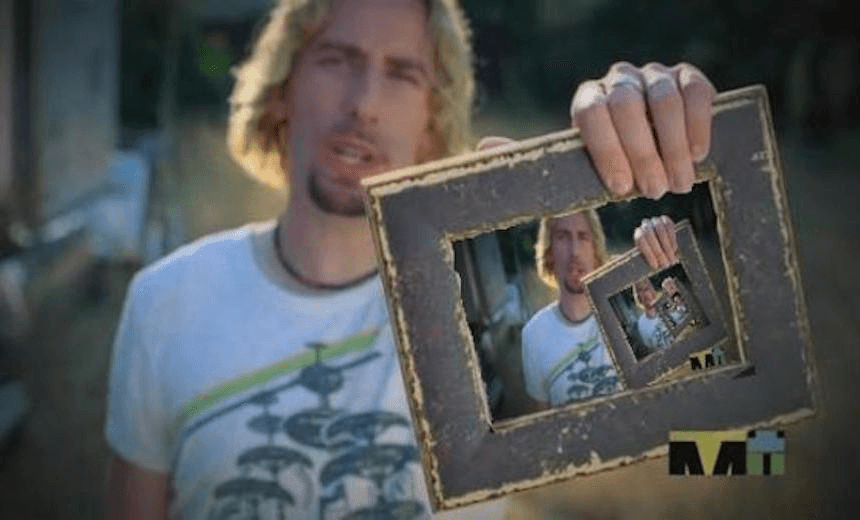Pete Douglas investigates how the Canadian post-grunge monolith became the universal shorthand for all bad music, while all other comers fell by the wayside.
Last week, bearded hipster-king and early Elton John enthusiast (that new song sounds like an outtake from Honky Chateau) Father John Misty jumped to the defence of Canadian post-grunge whipping boys Nickelback, after a column he had read online called reigning douche-dance duo The Chainsmokers “The Nickelback of EDM” (a comparison our own Matthew McAuley had made weeks prior). Misty was moved to bring this up during a discussion with NME about his upcoming record, defending Chad Kroeger and co. from the comparison to the vile Chainsmokers. “I ride for Nickelback,” he said. “‘How You Remind Me’, that’s a fucking great song, have you heard that song? It’s great.”
This was notable because it’s hard to recall anyone in the music world, let alone a pillar of the indie industrial complex, defending Nickelback in this way. Misty’s protection of the band seemed so clear-eyed and earnest that it couldn’t be irony – he simply felt Nickelback were unfairly maligned, and he was sick of it. And maybe he’s right.
To understand how the world came to hate Nickelback, we need to go back to the start of their commercial success: September 11, 2001. A day of horror. And the day Nickelback released their third album Silver Side Up. In 2001, Nickelback were a garden variety post-grunge band, with the aforementioned omni-present hit on the radio, but they were hardly alone. By this point, any of the eccentricities and oddness of American alternative rock of the 1990s had been well and truly whittled away, and Nickelback were simply one of a multitude of rockers mining the themes of grunge while ensuring their presentation was polished enough for mass consumption. Nickelback were popular, but not as big as other at-least-as-odious post-grunge bands like Creed (channeling Pearl Jam and filtering it through watered-down Christian rock) or Matchbox Twenty (channeling Pearl Jam and filtering it through Tom Petty and the Heartbreakers).
Then there was the bevy of other rising bands consisting of white guys with guitars who, in many cases, were just as bad as Nickelback: the humourless Nirvana-worship of Puddle of Mudd, the lug-headed bullying nu metal of Limp Bizkit, the generic angst of Fuel, and the earnestly-dull balladry Donald Trump’s favourite band, 3 Doors Down. But while all these other groups, either imploded spectacularly, or simply quietly disappeared, Nickelback went from strength to commercial strength.
And that’s why people really hate them. Nickelback’s greatest problem isn’t their music, it’s their consistent success. They simply kept punching out modern rock hits and ballads from the exact same template. By 2006 and the peak of Nickelback’s popularity (when All the Right Reasons sold 15 million units worldwide) multi-platinum rock acts were almost extinct. This success in the face of decline was no accident – Chad Kroeger is an incredibly astute businessman, using licensing, writing songs for others, and ownership of the record company that released Carly Rae Jepson’s monster hit ‘Call me Maybe’ to help build his fortune. But, in the wake of these most bountiful years, Nickelback-hatred began to grow.
In 2012, when neo-blues duo The Black Keys were profiled in Rolling Stone, drummer Patrick Carney mused that “Rock & roll is dying because people became OK with Nickelback being the biggest band in the world, so they became OK with the idea that the biggest rock band in the world is always going to be shit.” This is a ridiculous thing to blame one band for. Up to this point, Nickelback were a monumentally successful band that music fans liked to dump on (much as Carney did) as a proxy for the state of mainstream modern rock. After Carney’s comments however, Nickelback moved into prime position as the band du jour to kick in all of popular culture, whether you were familiar with their music or not.
It’s important to pause here and note that, yes, Nickelback’s biggest albums – The Long Road, All the Right Reasons and Dark Horse – are actually pretty bad. Sitting through these snide, cynical and sullen records isn’t fun. Kroeger sounds like he’s having a full-blown hernia when he sings, the band plod through the same old alt rock cliches in 4/4 time, never lightening the mood or changing their attack. On songs like the hits ‘Something in Your Mouth’ and ‘Figured You Out’ Kroeger’s stupidity and misogyny is utterly repugnant.
Strangely though, as Nickelback was becoming the ultimate insult band, their music was becoming more tolerable. That’s not to be confused with it becoming good (having listened to every Nickelback album to support this piece I’m pretty sure I’d rather lose my hand in a garbage disposal unit than subject myself to it again) but recent efforts Here and Now and No Fixed Address saw the band lightening their touch somewhat, dabbling in different musical styles, and even evolving a sense of self-depreciating humour.
In recent years the band have shown a sharp self awareness in dealing with their detractors, whether it’s calling out trolls online, just this week masterfully shooting down the Governator for making fun of them, or mocking other bands having a joke at their expense.
But none of this matters now. Nickelback can try anything they want, but the genie is out of the bottle. They will continue to be belittled by police departments, mercilessly mocked by the CEOs of the world’s largest companies, have their name used in vain in the decline and fall of modern political discourse, and just generally be abused in public forums until The Chainsmokers become well known enough to take their place – n0 matter how tired the joke gets.
The Spinoff’s music content is brought to you by our friends at Spark. Listen to all the music you love on Spotify Premium, it’s free on all Spark’s Pay Monthly Mobile plans. Sign up and start listening today.



